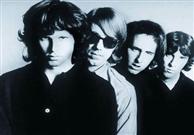|
|
||||
|
|
by Donald Levit  Following six fiction features he also scripted, Tom DiCillo does his first full-length (eighty-nine minutes) non-fiction, When You’re Strange--A Film about the Doors. His own narrator’s voice got bad press at Sundance, so Johnny Depp’s excellent one replaces it for commercial release. “Far from a nostalgic journey and much more than a biopic” about the iconic band, especially controversial Jim Morrison, it dispenses with talking heads pontificating hindsight insights and relies on b&w and color footage from heyday 1966-71. Apart from a couple indications about later recordings and sales, and a tardy homage from the singer’s estranged Navy admiral father, there is little “outside” for this insular world, not even a breath of wife Pamela Courson’s Hollywood heroin death thirty-four months after his in Morrison listed his family as “dead,” and DiCillo does not wade into the cloudy Freudian waters of childhood that informed Oliver Stone’s 1991 docudrama The Doors, from drummer John Densmore’s autobiographical Riders on the Storm. Somewhat murky in terms of technical quality and of its central figure’s chameleon more than Lizard King persona, the new film’s archival footage images the charisma, force, eroticism, and self-destructive drive of the music and erratic front man whose voice is gone by the end, anyway. Unfortunately, two motifs run throughout, one an out-of-place distraction, the other routine and debatable. From the outset is the tie-dyed man driving recklessly westward to L.A. Apparently the Wild Child himself who once studied at the UCLA Film School, though some believed him a bearded look-alike, he picks up a hitchhiker who drops from sight, covers a dying run-over canine, and listens to 95.5 KLOS-radio’s Jim Ladd announce the death of Jim Morrison, July 3, 1971, amidst reports of sightings of him still alive. Drive and driver must be misplaced metaphors for the singer’s life, death and, like those of also dead-at-twenty-seven Hendrix and Joplin, cult resurrection. The second is the linking of the Doors’ rise and reign to the violence and sexual revolution of the era. Inserts of MLK, RFK, Sharon Tate, Kent State, urban unrest and saturation bombing in Southeast Asia, balanced by counterculture love-ins with hippies on hallucinogenics, and even a protest Rally for Decency surge, are unnecessary not only as setting background but are also suspect when presented as zeitgeist formed by and forming the music. Morrison did mutter something about “erotic politician,” but the increasingly garbled “message” credited to the group as a whole -- the singer fancied his poetry over his vocalizing -- was sexual, anarchic and despairing. Shy at first, and analyzed as compensating for inner doubts and deficiencies, Morrison soon became assertive, uncooperative, unreliable. Insouciant, beguiling, mysterious, insulting or belligerent, he followed the oft-told rocker’s trajectory of drugs as self-destruction rather than enlightenment, of alcoholism, and of professional irresponsibility. Densmore, keyboardist co-founder Ray Manzarek, and guitarist Robby Krieger -- they had no bassist -- are remarkably patient with their troubled troublesome fourth, arguably realizing that he buttered their bread. Through discipline imposed by producer Paul A. Rothchild, in four-and-a-half years the Doors turned out albums that sold eighty million-plus copies. That studio music blares in the film and got audience members moving. Both of them contemporary Californian and audience-friendly, the Beach Boys celebrated surf, golden girls and little deuce coupes, the Grateful Dead hippie harmony; in dark contrast, the Golden State’s Doors out-malevolence’d bad-boy Rolling Stones, as Morrison antagonized paying customers. His three companions improved their musicianship even if the band could remain pretty sloppy in live performance, due largely to the singer’s stoned drunk antics, mumbling, sitting or lying down, not showing up. Switching early Elvis allegiance to Sinatra, he never cared to learn the dedication and discipline of the Chairman. So he crashed and burned, fulfillment of “you can’t burn if you’re not on fire.” Confused and impenetrable, Jim Morrison defies analysis and does not elicit pity, in this documentary or elsewhere. The soundtrack is preferable to the visuals. (Released by Rhino Entertainment Company and rated "R" for some sexual content including references, nudity, drug material and language.) |
||
|
© 2026 - ReelTalk Movie Reviews Website designed by Dot Pitch Studios, LLC |



